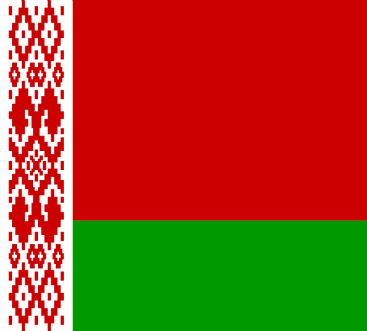Mr. Speaker, I rise to urge passage of H.R. 854, the Belarus Democracy Act. With important parliamentary elections in Belarus scheduled for October 17, it is essential that we pass the Belarus Democracy Act. This Congress must demonstrate its strong support for pro-democracy forces in Belarus and advance U.S. interests in the region. Now is the time to send a strong signal.
Since his election in 1995, Belarusian dictator Alexander Lukashenka has steadily undermined democratic institutions through a series of unfair elections and a seriously flawed constitutional referendum. The U.S. State Department, Helsinki Commission which I Chair, as well as the OSCE, the OSCE Parliamentary Assembly, the United Nations, the Council of Europe, the European Union and other international entities have all chronicled the appalling state of human rights and democracy there. Located in the heart of Europe, Belarus is juxtaposed to our NATO allies and will soon border the European Union.
The Lukashenka regime has repeatedly violated basic freedoms of speech, expression, assembly, association and religion. Since I introduced the Belarus Democracy Act last year, the situation in Belarus has only become more difficult.
Just within the last few months, the independent media, non-governmental organizations (NGOs), independent trade unions, religious groups, and democratic opposition leaders have faced increased harassment, arrest, detentions, and even violence. Opposition leaders have been imprisoned and beaten. NGOs have been closed down with increasing frequency. Independent media outlets continue to feel the wrath of the powers-that-be, including closures, defamation lawsuits, exorbitant fines, confiscations of newspapers or the suspension of their distribution, censorship and the deportation of an independent journalist from Ukraine who had lived in Belarus since 1990. Independent trade unions are subject to a pattern of obstruction, harassment and intimidation by the authorities.
In short, the situation in Belarus continues its downward spiral with daily reports of growing repression and human rights violations.
Here in Washington and at various OSCE Parliamentary Assembly meetings, I’ve had occasion to meet with the wives of the disappeared. The cases of their husbands, Yuri Zakharenka, Victor Gonchar, Anatoly Krasovsky, and journalist Dmitri Zavadsky who disappeared in 1999 and 2000 and are presumed to have been murdered, are a stark illustration of the climate of fear that pervades in Belarus. I am pleased that just last week the United States, together with the European Union, has decided to restrict admission to four top Belarusian officials implicated in these politically motivated disappearances. Reports of arms and weapons deals between the Belarusian regime and rogue states continue to circulate. Lukashenka and his regime were open in their support of Saddam Hussein. On August 24, the Treasury Department charged that Infobank of Belarus has been involved with money laundering involving fraudulent transactions pertaining to Iraq, where funds laundered by Saddam Hussein’s regime were derived from schemes to circumvent the UN Oil-for-Food program.
PROVISIONS OF BDA
Mr. Speaker, the main purpose of the BDA is to demonstrate U.S. support for those struggling to promote democracy and respect for human rights in Belarus despite the onerous pressures they face from the anti-democratic regime. This bill authorizes necessary assistance for democracy-building activities such as support for NGOs, independent media, including radio and television broadcasting to Belarus, and international exchanges.
The bill also encourages free and fair parliamentary elections, conducted in a manner consistent with international standards, in sharp contrast to the 2000 parliamentary and 2001 presidential elections in Belarus which flaunted democratic standards. As a result of those elections, Belarus has the distinction of lacking legitimate presidential and parliamentary leadership, which contributes to its self-imposed isolation. Parliamentary elections now have an added dimension, with Lukashenka’s September 7 announcement of a referendum to take place on the same day, that would pave the way to extend his rule beyond 2006, when his tenure is due to expire, to potentially join the ranks of “presidents for life” like President Niyazov in Turkmenistan and others in Central Asia.
As matters stand now, the deck appears to be stacked in Lukashenka’s favor, as the Belarusian Government has almost total control of the electoral process. Opposition parties have been allocated a negligible percentage of seats on district and precinct election commissions, and many candidates proposed by Belarusian democratic opposition parties have been denied registration. To their credit, the embattled opposition and non-governmental organizations have not given up. I have met with the leaders of the Belarusian opposition and have been impressed with their determination to participate in the coming elections and their courageous work to advance democracy, human rights and the rule of law, despite all of the obstacles placed in their way by the Lukashenka regime.
In addition, this bill includes “sense of Congress” language that would impose sanctions against the Lukashenka regime. U.S. Government financing would be prohibited, except for humanitarian goods and agricultural or medical products. The U.S. Executive Directors of the international financial institutions would be encouraged to vote against financial assistance to the Government of Belarus except for loans and assistance that serve humanitarian needs. This bill also requires reports from the President concerning the sale or delivery of weapons or weapons-related technologies from Belarus to rogue states and on the personal assets and wealth of Lukashenka and other senior leadership in Belarus.
I hope that the Belarus Democracy Act will help support those who desire a genuinely independent, democratic Belarus and serve as a catalyst to facilitate Belarus’ integration into democratic Europe. The measure is designed to be a counterweight to the pattern of clear, gross and uncorrected human rights violations by the Lukashenka regime. The Belarusian people, who have suffered so much both under past and present dictatorships, deserve to live in a society where democratic principles and human rights are respected. We must stand firmly on the side of those who long for freedom.




